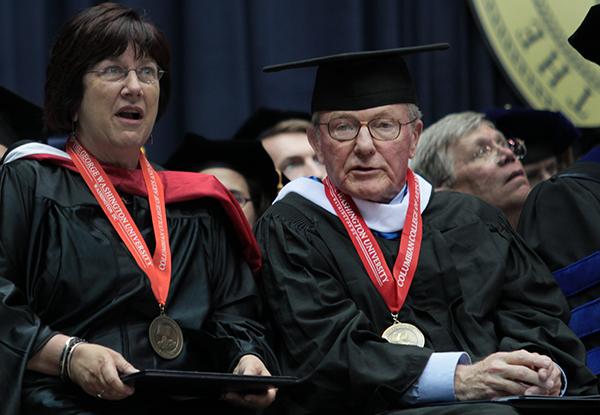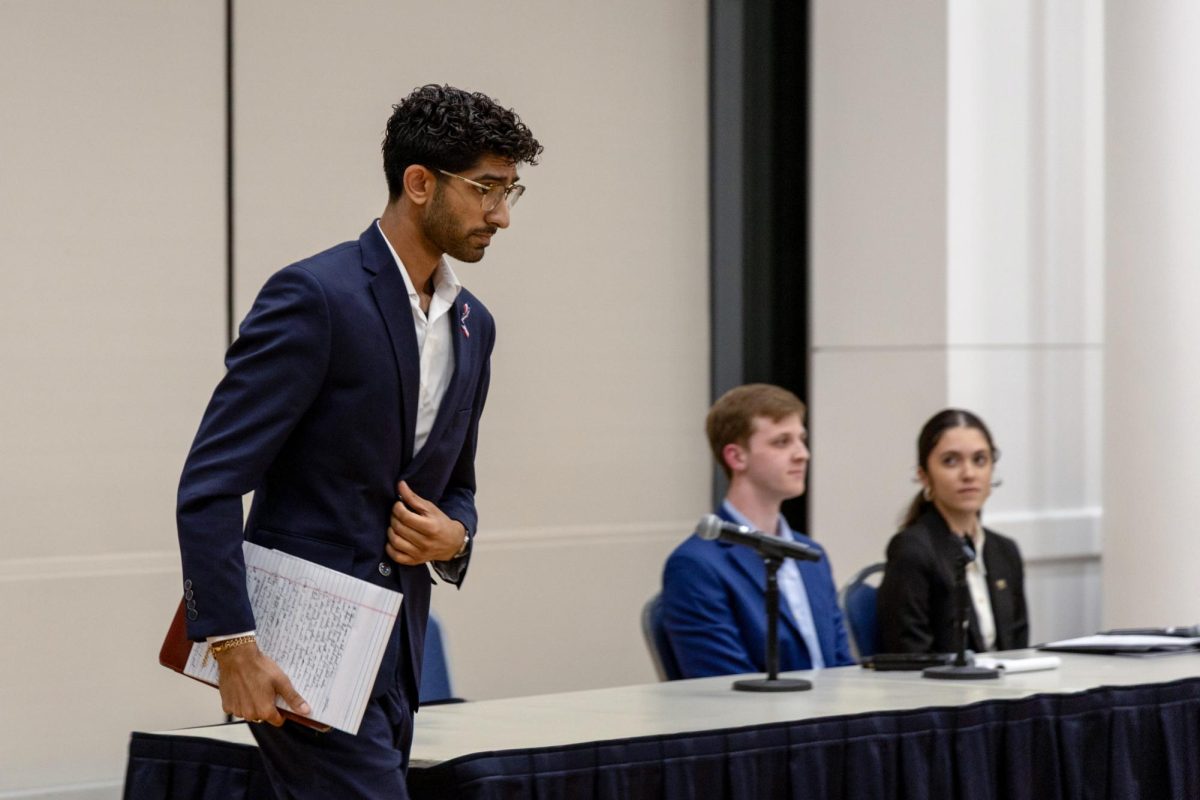Updated: Nov. 25, 2014 at 2:02 p.m.
Michael Shanahan, a veteran Washington journalist with piercing wit, may be best remembered as a steadfast advocate for the hundreds of students he mentored during his nearly 15 years teaching at GW.
Shanahan, who signed his emails “the prof,” often had lines of students waiting to see him about courses and future plans. He had a successful reporting career, but friends said he truly loved teaching the next generation of journalists, and made a lasting mark on students who he constantly pushed to work harder and embrace journalistic ideals.
The honest professor, who taught ethics, new media theory and Washington reporting, died Saturday morning at the age of 71. He had suffered a stroke Tuesday evening, according to a statement from his wife, Victoria, on Saturday afternoon.
A revered SMPA figure, he was the professor who students knew by reputation as one they had to work or take a class with before they graduated.
He came to the University by way of professor Steven Roberts, who had met Shanahan, then an Associated Press correspondent, when they were both covering Capitol Hill in the 1980s. Between weekly tennis matches and a passion for baseball, the two reporters formed a friendship that lasted beyond deadlines and career changes.
“Because he had these experiences and knew so much about the life of a Washington reporter, he could use that to help students to get a sense of the wider world,” Roberts said. “His classroom was only the beginning of his teaching, not the end of it.”
Roberts said Shanahan’s role wasn’t based in research or writing books, but in being there for students on a daily basis.
“His greatest contribution was student-by-student, day-by-day, course-by-course, class-by-class,” Roberts said.
Shanahan began working for the AP after he graduated from Pennsylvania State University in 1965. He enlisted in the U.S. Army shortly after and earned two awards – including a Bronze Star – for his service during a tour as an intelligence officer in Vietnam.
Last spring, he took a sabbatical from teaching to return to Vietnam and retrace his footsteps from his days as a soldier. He recounted the journey in a gripping first-hand account featured in the Boston Globe.
“As a veteran of the war, it was surreal to sit and chat with the former Viet Cong soldier and realize that 46 years earlier, his job was to kill me and other Americans fighting in the neighborhood,” he wrote. “My return to the tunnels — now a tourist attraction — met part of a long-held desire to revisit all of Vietnam.”
Shanahan covered some of the most important news stories of the last several decades, but he was modest when speaking about his professional successes. In class, his reporting stories sometimes slipped into lectures.
After the Vietnam War, Shanahan continued to write for the AP, working in the wire service’s Pittsburgh bureau, where he covered the Kent State shootings, before moving to the company’s D.C. bureau. He was a national political and congressional correspondent for McClatchy Newspapers for five years, and covered the Bush administration as a White House correspondent for Newhouse Newspapers.
During his more than 25-year-long career, he covered the 1988 presidential campaign, as well as President Bill Clinton’s successful White House bid in 1992. He did in-depth reporting about Clinton’s health care reform push, and also covered the Iran-Contra scandal and congressional debates about whether the U.S. should to enter the first Iraq War.
“He was a lot of fun on the campaign trail but, at the same time, recognized as a serious reporter,” said Carl Leubsdorf, who worked with Shanahan at the AP and is now a columnist. “He was also modest. I, for one, never knew about his distinguished service in Vietnam until I read his moving account of his return there.”
SMPA Director Frank Sesno said Shanahan, the school’s assistant director for student affairs, was a go-to adviser for undergraduates.
“Mike’s great contribution was to bring together his dedication as a teacher with his incredible experience as a reporter with his bottomless patience,” Sesno said.
Shanahan was also a fierce advocate for GW’s independent, student-run newspaper, The Hatchet. He was one of the longest-serving members of the newspaper’s Board of Directors, having joined in 2000.
He supported The Hatchet’s leadership through some of their most difficult challenges, such as adapting to digital pressures and becoming a weekly publication. He also helped lead the organization’s move from an office it had rented from the University to its own townhouse on F Street.
Lauren French, a former two-term Hatchet editor in chief and SMPA alumna, said Shanahan was dedicated to any student who showed an interest in the student paper and was always willing to share words of wisdom.
“I felt that I had a place at SMPA, that I had the ability to lead the paper one day and be part of the organization,” she said. “There were times that you needed someone to just have your back, and that’s what Mike did for me.”
French said her relationship with her mentor continued after her time at GW ended. They would often go to lunch at Thai Place, where his regular order was a duck entree with a non-alcoholic beer.
“We’d get dinner, lunch, brunch a lot. It became a real friendship that I’m going to miss,” she said. “It transcended the bounds of the student-teacher relationship.”
Casey Wood, who graduated from SMPA last spring, remembered the professor as seeming famous among students for genuinely listening to and caring for them. He said Shanahan would help anyone who proved they were passionate about journalism and were willing to work hard.
“Rather than push or pull you to that place, he simply guided you to that way,” he said. “He never meddled but rather was a guiding hand.”
Jake Sherman, a former Hatchet editor in chief and SMPA alumnus, said Shanahan was a vital part of the GW experience for any aspiring journalist.
Sherman, who now works as a congressional reporter for Politico, stayed in touch with the professor after graduation, and spoke to Shanahan’s Washington reporting class less than a month ago.
“There’s nobody like him,” he said. “It’s the biggest setback for GW, for SMPA, for anybody who wants to pursue journalism at GW. It’s almost incalculable, and, for aspiring journalists, he was the best.”
Shanahan is survived by his wife, Victoria Elliott, their two children, Martha and Claire, his daughter Tina Spurlock, and four grandchildren – Nathaniel Spurlock, Emily Spurlock, Matthew Leo Spurlock and Owen Spurlock. Martha is following in her father’s footsteps as a reporter for the Keene Sentinel in New Hampshire. His daughter Claire is a student and plays soccer at New York University.
SMPA will hold a memorial service for Shanahan on Saturday, Dec. 6 at 11 a.m. All who knew the professor are invited to attend the service at 1957 E St. in room 213.
This post was updated to reflect the following correction:
The Hatchet incorrectly reported that Shanahan had two daughters. He has three daughters – Martha, Claire and Tina Spurlock. We regret this error.







